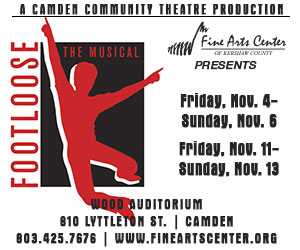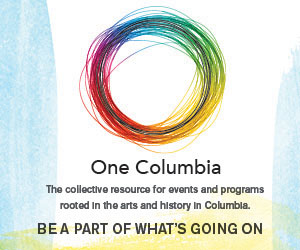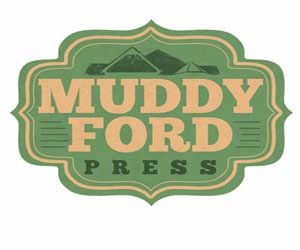Q&A with Singer/Songwriter and South Carolina Native Marshall Chapman
 One of the advantages of having Lee Smith as our One Book, One Columbia author is she has a lot of cool friends—like South Carolina native Marshall Chapman, one of the state’s most significant musical figures of the last 40 years. Chapman has been a songwriter and performer in Nashville since the 1970s, and her songs have found their way on albums by Jimmy Buffett, Emmylou Harris, and Joe Cocker, among others, and she also has 13 solo albums of her own. Of those, the most recent two, Big Lonesome (2010) and Blaze of Glory (2013), represent some of the finest work of her career. These albums come on the heels of Chapman’s turn to prose—her two critically-acclaimed and award-winning memoirs, Goodbye Little Rock and Roller (2003) and They Came to Nashville (2010), both books which demonstrated a life lived hard and well. In recent years Chapman has also written for such publications as Oxford American, Nashville Arts Magazine, Garden & Gun, and Southern Living.
One of the advantages of having Lee Smith as our One Book, One Columbia author is she has a lot of cool friends—like South Carolina native Marshall Chapman, one of the state’s most significant musical figures of the last 40 years. Chapman has been a songwriter and performer in Nashville since the 1970s, and her songs have found their way on albums by Jimmy Buffett, Emmylou Harris, and Joe Cocker, among others, and she also has 13 solo albums of her own. Of those, the most recent two, Big Lonesome (2010) and Blaze of Glory (2013), represent some of the finest work of her career. These albums come on the heels of Chapman’s turn to prose—her two critically-acclaimed and award-winning memoirs, Goodbye Little Rock and Roller (2003) and They Came to Nashville (2010), both books which demonstrated a life lived hard and well. In recent years Chapman has also written for such publications as Oxford American, Nashville Arts Magazine, Garden & Gun, and Southern Living.
This is all in addition to her collaboration with Smith, Jill McCorkle, and Matraca Berg, Good Ole Girls, a musical play which has toured throughout the South and had a brief run off-Broadway. Chapman will be performing songs from that play with Smith and McCorkle at 701 Whaley this Thursday, February 26th as part of the closing party for this year’s One Book festivities. Chapman will also be playing a show on Wednesday, May 13th, at Conundrum Music Hall.
Jasper caught up with Chapman recently to chat about her long history in the musical world and late-career renaissance.
Jasper: Blaze of Glory was one of the best-reviewed albums of your career. Do you think you could have imagined 30 or 40 years ago that you would still be making great music?
Marshall Chapman: No, not really. Mainly because I never thought I’d live this long. (laughs)
J: How has the songwriting process changed over the years?
MC: I don’t chase it like I used to. These days, I just let the songs come to me.
J: Did you have any specific goals or ideas in mind when you were writing for this record?
MC: Not really. But I knew I was onto something. At first, I thought it was going to be this sexy record. I even had a working title—Sexagenarian. But then it deepened into the whole mortality thing. As soon as I finished “Blaze of Glory,” [the song] I knew it would be the title of the album. And also the last song you hear.
J: These songs all feel really fresh, even though it’s still very much the sound and style you were working in during the 1970s and 1980s. The straight-up Bo Diddley take on “Love in the Wind” and the soulful rendition of “Nearness of You,” for instance, sound like reinvigorated takes on classic territory. Why do you think that is?
MC: Oh, I don’t know. I was working with producers and co-producers back in the 70s and 80s. I didn’t really know that much about making records. I was like Gidget goes to Nashville and gets a Record Deal. But with these last two [Blaze of Glory and Big Lonesome], I was much more focused. Probably because I’m older. It’s like … Last call to get it right! I’ve been doing this a long time. And it’s taken every bit of that time to learn how to trust myself in the studio.
J: You didn’t tour as much behind this record as Big Lonesome, and you’ve become more of a writer, actor, and collaborator (like on Good Ol’ Girls) in recent years. How does that balance work? Has the lack of touring affected your ability to promote your music?
Well, there’s a personal reason I didn’t tour as much behind this album as with Big Lonesome. Let’s just say all the wheels supporting my life came off all at once and leave it at that. As for “lack of touring” affecting my “ability to promote” my music, those two things are pretty much entwined. Nothing gets the word out like a live performance. But it’s true. I’m cutting back on live performances.
As for the rest, I’ve always enjoyed writing prose, so writing the two books felt pretty natural. I’ve always been interested in the stories behind songs. Especially when the stories are better than the songs!
The idea for Good Ol’ Girls was conceived by songwriter Matraca Berg. Matraca called me out of the blue one day, saying she wanted to do a musical with me and Lee Smith. She was a big fan of Lee’s writing, but she didn’t know her. So I called Lee, since I knew her from when she lived in Nashville in the 1970s. At first Lee didn’t seem interested. But then she called me back saying she was in and that she was bringing in Jill McCorkle and a director! [Paul Fergusen, who ended up doing the
adaptation.] The show has toured the South and even had a run off-Broadway. It’s playing in a couple of theaters this spring. But this week at 701 Whaley, Lee, Jill and I will be doing our own version of Good Ol’ Girls. And probably throw in some new stuff. I never really know what‘s gonna happen when the three of us get together. But I can assure you this — something will happen! It’s outrageous whenever the three of us get together. Why we haven’t been arrested is beyond me.
As for acting, I’ve done three movies in the past three years—all since turning sixty-two. Maybe the Universe is trying to tell me something.
J: You’ve lived in Nashville for a long time (since you matriculated at Vanderbilt?). What does being from South Carolina mean to you now? What’s it like coming back for tours?
MC: Where you come from … it stays with you. Especially if you’re from South Carolina! Seriously, it’s always special coming back to South Carolina to perform. I was in Spartanburg a lot this past fall dealing with the death of my mom. I was driving around there thinking, Hmmmm, maybe I could come back and live here! I even looked at some property off St. John Street.
J: You’ve written two award-winning non-fiction books about your life, Goodbye, Little Rock and Roller and They Came to Nashville. Any plans for a third, either fiction or non-fiction?
MC: Well, I’ve been writing a monthly column called “Beyond Words” for a Nashville magazine for nearly five years. They told me I could write about anything I wanted, and I imagine I’ve taken them to task on that. (laughs) Anyway, I’m thinking about putting a collection of those [essays] in a book. As for a novel … I’ve had a few stories published, so I’ve danced around fiction. But the idea of writing an entire novel like Lee and Jill do all the time terrifies me. Which means I’ll probably do it one day.
J: The record closes with the title track, which is a kind of uplifting take on mortality, almost like a gospel song. You also recount the most pivotal moment of your life, seeing Elvis as a 7 year-old in the song. Can you tell me a little bit about the idea and inspiration behind that tune?
MC: I wrote the first verse to that song while sitting at my breakfast table. I had a feeling it might be a keeper, so I captured just that little bit on a little recorder. A few weeks later, I returned to it and immediately wrote a second verse. And then a bridge about Jimi Hendrix and Janis Joplin and a few other musical heroes who died young, i.e., in a blaze of glory. But something wasn’t right. It felt forced. So I went for a walk, and when I got back, I started from from scratch. I just went back to where it all began—seeing Elvis. As soon as I wrote “that colored balcony came crashing to the floor,” I’m thinking, Now what! I mean, you don’t want to raise the bar too high. So I got real quiet. And then that last verse about the sun just landed on the page. “Blaze of Glory” wrote itself. All I had to do was get out of the way.
For more information about Marshall Chapman and the latest updates about her various projects, check out tallgirl.com






.jpg)
